
Dutch postcard by Foto-archief Film en Toneel, no. 3370. Photo: Universal-International. Ann Blyth in Another Part of the Forest (Michael Gordon, 1948).
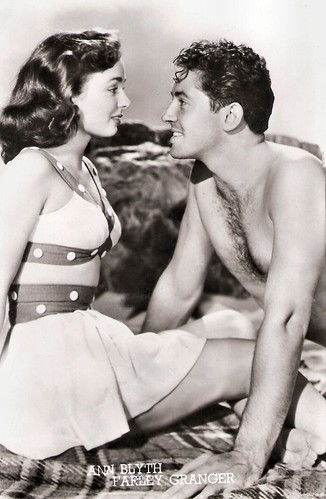
Vintage postcard. Photo: Universal International. Farley Granger and Ann Blyth in Our Very Own (David Miller, 1950).

German photo-card. Photo: Metro-Goldwyn-Mayer. Mario Lanza and Ann Blyth in The Great Caruso (Richard Thorpe, 1951).

British postcard in the Picturegoer Series, London, no. D. 213. Photo: Universal International. Anthony Quinn and Ann Blyth in The World in his Arms (Raoul Walsh, 1952).
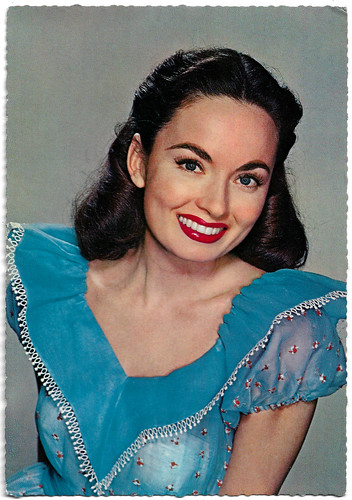
West-German postcard by Krüger, no. 902/6.
A scheming, ungrateful daughter
Ann Blyth was born in 1928 in Mount Kisco, New York, to Harry and Nan Lynch Blyth. After her parents separated, she, her mother and her sister moved to a walk-up apartment on East 31st Street in New York City, where her mother took in ironing. Ann attended St. Patrick's School in Manhattan.
Blyth performed on children's radio shows in New York for six years, making her first appearance when she was five. When she was nine she joined the New York Children's Opera Company. Her first acting role was on Broadway at age 13 in Lillian Hellman's WWII drama 'Watch on the Rhine' (1941-1942). She played the part of Paul Lukas's and Mady Christians's daughter, Babette. The play ran for 378 performances and won the New York Drama Critics' Circle Award.
After the New York run, the play went on tour, and while performing at the Biltmore Theatre in Los Angeles, Blyth was noticed by director Henry Koster and given a screen testoffered a contract with Universal Studios. Blyth began her acting career initially as "Anne Blyth", but changed the spelling of her first name back to "Ann" at the beginning of her film career. She made her film debut in 1944, teamed with Donald O'Connor and Peggy Ryan in the teenage musical Chip Off the Old Block (Charles Lamont, 1944). She followed it with two similar films: The Merry Monahans (Charles Lamont, 1944) with O'Connor and Ryan again, and Babes on Swing Street (Edward C. Lilley, 1944) with Ryan.
She had a support role in the bigger budgeted Bowery to Broadway (Charles Lamont, 1944), a showcase of Universal musical talent. On loan to Warner Brothers, Blyth was cast 'against type' as Veda Pierce, the scheming, ungrateful daughter of Joan Crawford in Mildred Pierce (Michael Curtiz, 1945). Her dramatic portrayal won her outstanding reviews, and she received a nomination for an Academy Award for Best Supporting Actress.
Blyth was only 16 when she made the film, for which Crawford won the Best Actress award. After Mildred Pierce, Blyth sustained a broken back while tobogganing in Snow Valley, and was not able to fully capitalise on the film's success. After a long convalescence (over a year and a half in a back brace), she made two films for Mark Hellinger's unit at Universal: Swell Guy (Frank Tuttle, 1946), with Sonny Tufts, and Brute Force (Jules Dassin, 1947) with Burt Lancaster. During this time her father died.
Metro-Goldwyn-Mayer borrowed her to play the female lead in Killer McCoy (Roy Rowland, 1947), a boxing film with Mickey Rooney that was a box office hit. Back at Universal, she did a Film Noir with Charles Boyer, A Woman's Vengeance (Zoltan Korda, 1948). She was then cast in the part of Regina Hubbard in Lillian Hellman's Another Part of the Forest (Michael Gordon, 1948), an adaptation of the 1946 play where Regina had been played by Patricia Neal. The play was a prequel to 'The Little Foxes'.
Blyth followed it with Mr. Peabody and the Mermaid (Irving Pichel, 1948) with William Powell. She was top-billed in Red Canyon (George Sherman, 1949), a Western with Howard Duff. Paramount borrowed Blyth to play the female lead in Top o' the Morning (David Miller, 1949), a daughter of Barry Fitzgerald who is romanced by Bing Crosby. It was the first time she sang on screen. Back at Universal, she was teamed with Robert Montgomery in Once More, My Darling (Robert Montgomery, 1949), meaning she had to drop out of Desert Legion. She did a comedy with Robert Cummings, Free for All (Charles Barton, 1949). In April 1949, Universal suspended her for refusing a lead role in Abandoned (1949). Gale Storm played it.
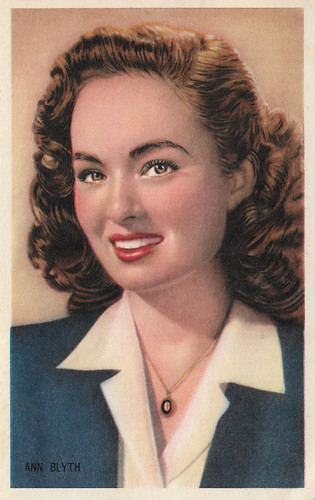
Belgian card by Kwatta, Bois d'Haine, no. C. 206. Ann Blyth in Killer McCoy (Roy Rowland, 1947).
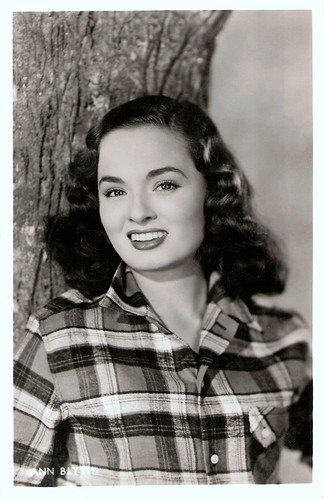
Dutch postcard by J. Sleding N.V., Amsterdam, no. 1250.

Dutch postcard.
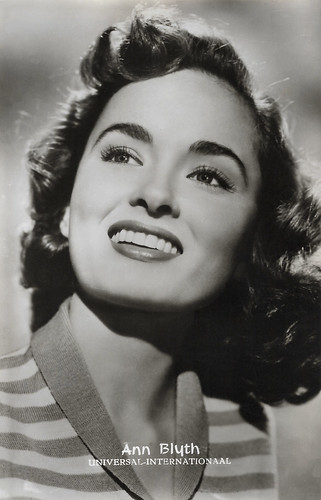
Belgian postcard, no. 11. Photo: Universal-International.
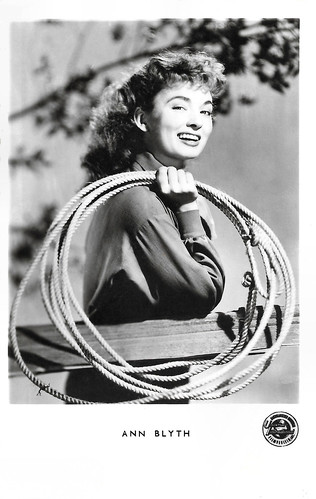
West-German postcard by Netter's Star Verlag, Berlin. Photo: Universal International. A publicity still for Red Canyon (George Sherman, 1949).
A massive box office hit
Ann Blyth was borrowed by Sam Goldwyn to star opposite Farley Granger in Our Very Own (David Miller, 1950). Universal gave her top billing in a romantic comedy, Katie Did It (Frederick De Cordova, 1951). Blyth was borrowed by MGM for The Great Caruso (Richard Thorpe, 1951) opposite Mario Lanza which was a massive box office hit. She made Thunder on the Hill (Douglas Sirk, 1951) with Claudette Colbert and had the female lead in The Golden Horde (George Sherman, 1951) with David Farrar.
Then, 20th Century Fox borrowed her to star opposite Tyrone Power in I'll Never Forget You (Roy Ward Baker, 1952), a last-minute replacement for Constance Smith. She appeared on TV in Family Theater in an episode called 'The World's Greatest Mother' alongside Ethel Barrymore. Universal teamed Blyth with Gregory Peck in The World in His Arms (Raoul Walsh, 1952). She was top-billed in the comedy Sally and Saint Anne (Rudolph Maté, 1952) and was borrowed by RKO for One Minute to Zero (Tay Garnett, 1952), a Korean War drama with Robert Mitchum where she replaced Claudette Colbert who came down with pneumonia.
MGM had been interested in Blyth since The Great Caruso. In December 1953, Blyth left Universal and she signed a long term contract with MGM. She was the leading lady in All the Brothers Were Valiant (Richard Thorpe, 1953) with Stewart Granger and Robert Taylor, stepping in for Elizabeth Taylor who had to drop out due to pregnancy. On television, she was in a version of A Place in the Sun for Lux Video Theatre alongside John Derek. Back at MGM, Blyth had the lead in the remake of Rose Marie (Mervyn LeRoy, 1954) with Howard Keel, which earned over $5 million but lost money due to high costs.
She was meant to be reteamed with Lanza in The Student Prince (Richard Thorpe, 1954) but he was fired from the studio and was replaced in the picture by Edmund Purdom. The film did well at the box office. Blyth and Purdom were reunited on a swashbuckler, The King's Thief (Robert Z. Leonard, 1955). She was teamed again with Keel on the musical Kismet (Vincente Minnelli, 1955). Despite strong reviews, the film was a financial flop.
She was named for the female lead in The Adventures of Quentin Durward (1955) but was eventually not cast in the film. MGM put Blyth in Slander (Roy Rowland, 1957) with Van Johnson. Sidney Sheldon cast Blyth in The Buster Keaton Story (Sidney Sheldon, 1957) with Donald O'Connor at Paramount. Warner Bros then cast her in the title role of The Helen Morgan Story (Michael Curtiz, 1957) with Paul Newman. Blyth reportedly beat 40 other actors for the part. Even though her voice was more like the original Helen Morgan, her vocals were dubbed by Gogi Grant. That soundtrack was much more successful than the film itself.
Blyth made no further films. In 1957, she sued Benedict Bogeaus for $75,000 for not making the film Conquest. From the late 1950s into the 1970s, Blyth worked in musical theatre and summer stock, starring in the shows 'The King and I', 'The Sound of Music', and 'Show Boat'. She also appeared on television, including co-starring opposite James Donald in The Citadel (1960), an adaptation of A.J. Cronin's novel. She guest-starred on episodes of such series as The DuPont Show with June Allyson, The Dick Powell Theatre, Saints and Sinners, The Christophers, Wagon Train, The Twilight Zone, and Burke's Law. Several of these appearances were for Four Star Television with whom Blyth signed a multi-appearance contract.
Blyth also became the spokesperson for Hostess Cupcakes. Her last television appearances were in episodes of Switch (1983), Quincy, M.E. (1983) and Murder, She Wrote (1985). In 1985, she officially retired. For her contributions to the film industry, Blyth has a motion pictures star on the Hollywood Walk of Fame at 6733 Hollywood Boulevard.
In 1953, Ann Blyth married obstetrician James McNulty, brother of singer Dennis Day, who had introduced them. After her marriage, Blyth took somewhat of a reprieve from her career to focus on raising their five children, Timothy Patrick (1954); Maureen Ann (1955); Kathleen Mary (1957); Terence Grady (1960); and Eileen Alana (1963). Blyth continues to be seen occasionally at social functions and conventions.
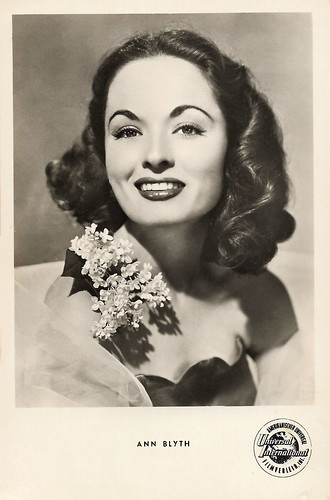
West-German postcard by Kunst und Bild, Berlin, no. A 414. Photo: Universal International.
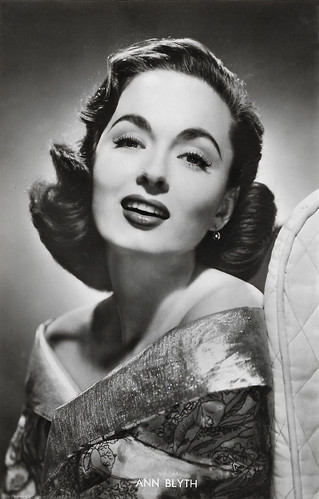
Belgian postcard. Photo: M.G.M.

Dutch postcard by Sparo (Gebr. Spanjersberg N.V., Rotterdam). Photos: Metro-Goldwyn-Mayer. The picture stars are Judy Garland, Betty Hutton, Vivian Blaine (twice), Monica Lewis, Pier Angeli, Ann Blyth and Mario Lanza, Coleen Gray, and Jane Powell. The postcard must date from ca. 1951 when Blyth and Lanza starred together in The Great Caruso (Richard Thorpe, 1951).
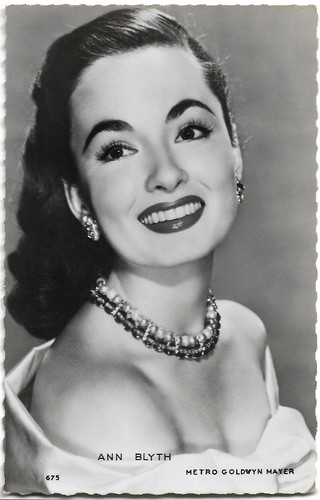
French postcard by Editions P.I., Paris, no. 675. Photo: Metro-Goldwyn-Mayer. 1952.
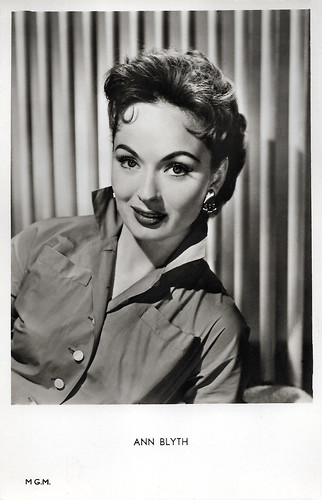
Belgian postcard, no. 11. Photo: MGM.
Sources: Gary Brumburgh (IMDb), Wikipedia (Dutch and English) and IMDb.
No comments:
Post a Comment